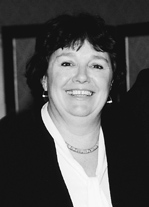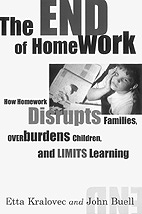Kralovec focuses on improving public education

At Lewis & Clark, a nurturing faculty helped Kralovec discover a love of intellectual life and a passion for teaching. Since then, she has embarked on a distinguished career as an expert on alternative school design and an advocate for public school reform. Among the highlights: she headed up one of the longest-running alternative schools in California, held administrative and faculty posts at Hofstra university (New York), College of the Atlantic (Maine), and Africa University (Zimbabwe), and coauthored one of the most talked-about books of 2000, The End of Homework: How Homework Disrupts Families, Overburdens Children, and Limits Learnin. She currently designs alternative learning environments for at-risk and homeless students for a nonprofit job-training company in Maine.
The College recently named Kralovec the 2001 Distinguished Alumna in recognition of her exemplary work and professional accomplishments. “Her work in the alternative-school setting and her research on the impact of homework on children together reflect that she is passionately exploring the untested, less-traveled path for the purpose of making a difference in how we educate our nation’s children,” says Jamie Forman, president of the Lewis & Clark College Board of Alumni.
Undergirding her work in education, Kralovec says, is a fervent desire to strengthen public schools. Her efforts focus on giving parents and educators the tools they need to improve their local schools. “What I’m interested in,” says Kralovec, “is a richer, more diverse public discussion about schooling.”
The seeds of her interest were planted more than 30 years ago at Lewis & Clark. For the first time, she found teachers who took her at face value and who were interested in her as a person. Mentors such as Jerry Baum, professor emeritus of English, and the late Alan Kittel, professor of history, stimulated her lifelong interest in learning—and teaching. “Lewis & Clark gave me a second chance that has shaped my commitment to education and certainly the way I teach,” she says.
After graduating from Lewis & Clark with a degree in English, Kralovec earned her teaching certificate from California State University at Northridge. She began her career in Laguna Beach, California, where she eventually developed and implemented an innovative high school program that integrated vocational training and academic work for at-risk students. She returned to school in 1982, earning a master’s degree in education and politics and later an Ed.D. in philosophy and education, both from Columbia university’s Teachers College.
In 2000, Kralovec and coauthor John Buell struck a nerve with publication of The End of Homework. The book, which argues that homework exacerbates inequalities and puts undue stress on students and families, sparked debates across the country. The widespread media attention surprised even Kralovec, who knew from years of research that people hold deep-seated beliefs about homework. “Every time I spoke,” she recalls, “people reacted passionately to the topic.”
Her forthcoming book, The Overburdened School, builds on her ongoing conversations with parents and teachers about school reform. “I’ve come to understand my work as being able to speak to everyday parents,” she explains. The book aims to provide parents with “the kind of information they need to be authentically involved in their school community to improve their schools for learning.” It is due out this fall.
As Kralovec continues to grapple with complex issues of public school reform, she thanks the College for giving her the chance to do so. “Had it not been for Lewis & Clark,” she says, “I probably would have gone through life thinking what my high school guidance counselor told me was right.” Thankfully, she thought otherwise.
—by Dan Sadowsky

More L&C Magazine Stories
Lewis & Clark Magazine is located in McAfee on the Undergraduate Campus.
MSC: 19
email magazine@lclark.edu
voice 503-768-7970
fax 503-768-7969
The L&C Magazine staff welcomes letters and emails from readers about topics covered in the magazine. Correspondence must include your name and location and may be edited.
Lewis & Clark Magazine
Lewis & Clark
615 S. Palatine Hill Road MSC 19
Portland OR 97219

